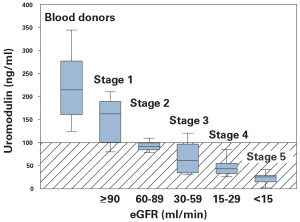Uromodulin is a kidney-specific glycoprotein, which is mainly secreted in the urine but also, in small amounts, into the bloodstream. Since it was discovered several years ago that mutations and certain polymorphisms in the uromodulin-coding gene (UMOD) are associated with various kidney disorders and kidney vitality, the protein has been increasingly researched. Today, uromodulin is considered a new biomarker for kidney function.
 EUROIMMUN has developed the first standardised ELISA for the diagnostic determination of the uromodulin concentration in blood. Validation studies have shown that the serum uromodulin level measured by ELISA correlates significantly with the five stages of chronic kidney insufficiency (definition of stages according to the “Kidney Disease Outcomes Quality Initiative” (K/DOQI), determined on the basis of the estimated glomerular filtration rate)[1]. Thus, uromodulin level in serum is suited for rapid and straightforward assessment of kidney vitality at any disease stage by means of a defined cut-off.
EUROIMMUN has developed the first standardised ELISA for the diagnostic determination of the uromodulin concentration in blood. Validation studies have shown that the serum uromodulin level measured by ELISA correlates significantly with the five stages of chronic kidney insufficiency (definition of stages according to the “Kidney Disease Outcomes Quality Initiative” (K/DOQI), determined on the basis of the estimated glomerular filtration rate)[1]. Thus, uromodulin level in serum is suited for rapid and straightforward assessment of kidney vitality at any disease stage by means of a defined cut-off.
Measurement of the uromodulin concentration in serum using the ELISA has several benefits:
- In contrast to the serum concentration of the established kidney function marker creatinine
- the serum level of uromodulin correlates directly linearly with the GFR, with no “blind” area in the early phases (stages 1 and 2) of kidney insufficiency;
- the uromodulin concentration is not influenced by external factors (e.g. muscle mass, nutrition);
- uromodulin measurements using the ELISA can be easily evaluated according to a defined cut-off and need not be converted. This reduces errors resulting from inaccurate calculations.
- The time-consuming 24-hour urine collection for the determination of the GFR using protein clearance can be dispensed.
- The ELISA is fully automatable.
Irregular uromodulin measurements allow early identification of kidney insufficiency and treatment of patients, thus avoiding long-time consequences. Corresponding kidney damage can result from various different conditions and circumstances, such as certain autoimmune diseases (systemic lupus erythematosus, membranous nephropathy, Goodpasture syndrome), diabetes, high blood pressure or long-term medication. The kidney function in patients at risk should therefore be assessed on a regular basis. The uromodulin ELISA is ideal for the screening of large sample numbers due to its simple handling and quick evaluation. In addition, there has been some scientific evidence from ongoing studies that the ELISA can also be used for the monitoring of therapy and postoperative care after kidney transplantation.
[1] Scherberich JE, et al., Abstract contribution to “Symposium Biomarker der kardiorenalen Achse” 2015, Mannheim, Germany.
